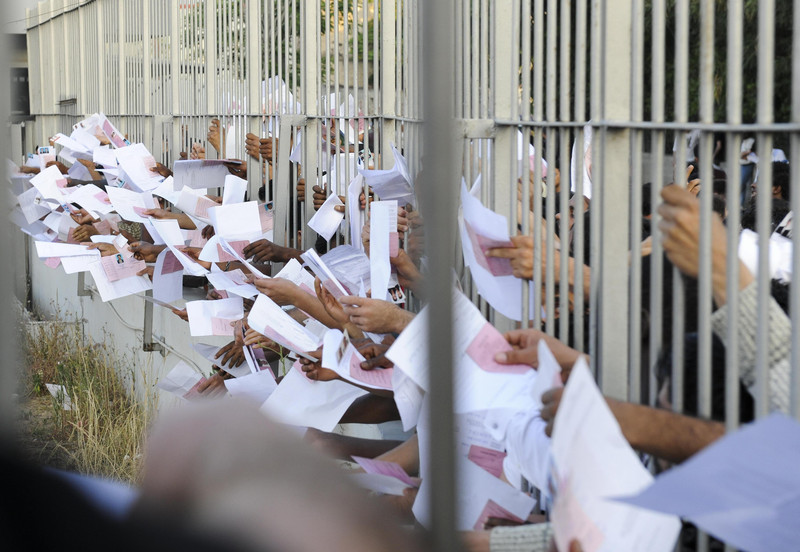EU & the World
EU Presidency Seeks To Place Children And Families In Asylum Detention

As part of the internal EU state discussions about asylum reform, families with small children are now being detained at the border.
It is part a shift to offloading the responsibility on EU countries like Italy and Greece instead of relocating asylees, while giving these first-arriving states plenty of options not to apply EU laws.
Rights campaigners claim that the end result could be more detentions, more illegal pushbacks, or even a boost to migrant smugglers who are eager to exploit the clampdown on fundamental rights. Critics warn that it could lead to the same ghetto camps seen on Greek islands.
In its original proposal, the European Commission sought to exclude families that have children under 12 years of age from a bill intended to speed up the asylum process.
Margaritis Schinas, vice-president of the European Commission in 2020, said: “We exclude them so that we can ensure that they don’t go through this cumbersome and lengthy process that is often inhumane.”
In a document dated 28th April, seen by EUobserver and dated 3 years later, the Swedish EU Presidency wants to include families with children in the process.
Birgit Sippel (German socialist) is one of the leading MEPs involved in the reform of asylum laws. She has said that the Parliament will oppose.
In an email, she stated that “the position of the parliament is beyond doubt: The border procedure shall not apply to unaccompanied minors or families with children of 12 years and younger.”
Sippel said the maximum age should be 18 in accordance with the UN Convention on the Rights of the Child.
Oxfam’s EU asylum and migration policy advisor Stephanie Pope said, “It is the worst version that we’ve seen to date.”
She said that the text presented by the council, which represents member states, will mean vulnerable people will be sent to the border procedure.
All those who come from countries where the rates of recognition for international protection are below 20% will be sent. This was also part of the original plans.
The commission has now buckled under pressure from hawkish EU countries like the Netherlands and Denmark, who are worried that migrants will try to move and settle somewhere else.
‘Adequate capacity’
The commission has proposed a concept called ‘adequate capability’, which tries to determine how many people are automatically sent through the border procedure.
It means that everyone is sent, regardless of their recognition rate, until a pre-determined threshold has been reached.
“The challenge is that this proposal has nothing to do with what was originally proposed,” said Catherine Woollard at the European Council on Refugees and Exiles in Brussels.
She said that the horrific conditions that will likely appear along the border as a result of this will be used to further encourage EU states to curtail the asylum process altogether through illegal pushbacks.
Other factors are also at play. The EU and its institutions face intense pressure to finalise the overhaul of the asylum and immigration pact at the beginning of next year.
In the first half of this month, the European Parliament approved its mandate for negotiations with the Council.
Under the Swedish EU presidency’s stewardship, the council is negotiating away rights by punching gaps in EU law.
They hope to convince the ‘Med 5 (composed by Cyprus, Greece, Italy and Malta) to accept more responsibility at the EU’s borders. This includes reviving the so-called regulation of instrumentalisation that EU states had voted against in December.
The regulation contained a number of loopholes that allowed EU states to abandon their asylum rights when a country like Belarus pushed people across the border. The tactic is to merge the regulation with the crisis regulation – another bill in the pact – as a possible concession for the Med 5.
Woollard said that “these efforts to block the instrumentisation regulation may be a kind of Pyrrhic win, because it will come back to being incorporated in the crisis regulation”.
According to another source, Spain initially opposed the merger, but now seems to be giving in. This raises questions about how far its upcoming EU Presidency, beginning in July, will push for more loopholes and exceptions.
EU & the World
Inmates Escape New Orleans Prison: Updates on the Situation
Several inmates have reportedly escaped from the Orleans Parish Justice Center, police announced on May 16.
EU & the World
Who Is Abe Diaw? About the Chris Brown Assault Lawsuit & Accusations
Chris Brown is facing allegations from Abe Diaw over an alleged 2023 nightclub assault.
EU & the World
Chris Brown Tour 2025: Updates on Concert Dates, Cities, Ticket Prices & More
The ‘Under the Influence’ artist announced his upcoming 2025 world tour, which will kick off in Miami!
-
EU & the World3 days ago
Who Is Valeria Marquez? About the Influencer Who Was Shot During Livestream
-
EU & the World4 days ago
Cardi B & Offset’s Relationship Timeline: From Marriage To Cheating Drama & Split
-
Politics5 days ago
EU Assesses Support for Ukrainian Refugees: Challenges and Flexibility in Humanitarian Response
-
Sports5 days ago
Matteo Berrettini forced to retire amid tears at Internazionali d'Italia
-
EU & the World7 days ago
‘Suits LA’ Canceled: Inside NBC’s Cancelation of the Stephen Amell Series
-
Travel3 days ago
Crete earthquake: Is it safe to travel to the Greek island following tsunami warning?
-
EU & the World5 days ago
Tory Lanez’s Net Worth: How Much Money He Makes Amid Jail Time
-
Sports6 days ago
Clásico da leggenda: Barcelona wins back Real 4-3, La Liga one step away